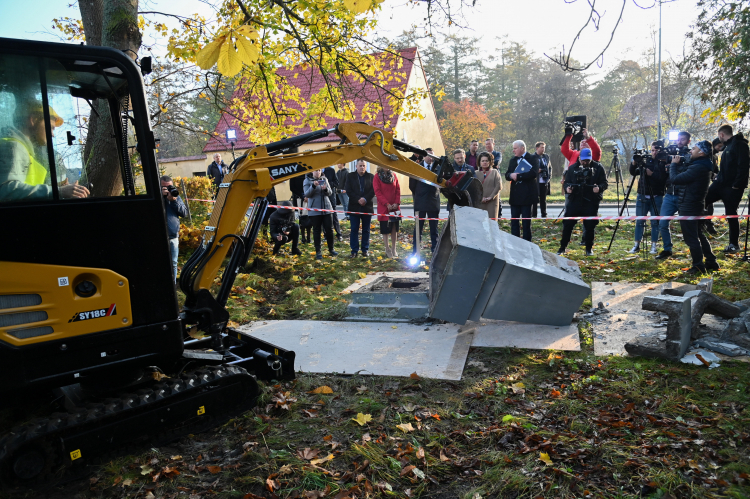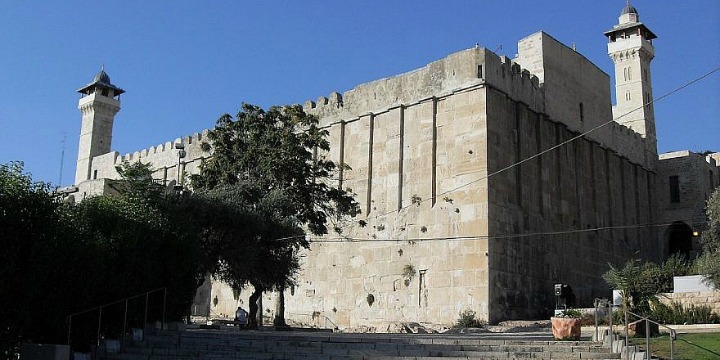 27.10.2022. Demontaż pomnika poświęconego Armii Czerwonej w Bobolicach. Fot. PAP/M. Bielecki
27.10.2022. Demontaż pomnika poświęconego Armii Czerwonej w Bobolicach. Fot. PAP/M. Bielecki
 Sondaż Kantar Public dla IPN: 49 proc. Polaków popiera demontaż pomników Armii Czerwonej
Sondaż Kantar Public dla IPN: 49 proc. Polaków popiera demontaż pomników Armii Czerwonej
Maciej Replewicz
Blisko połowa społeczeństwa pozytywnie ocenia usunięcie „pomników wdzięczności” budowanych w latach 1945–89 dla upamiętnienia armii sowieckiej, wynika z sondażu Kantar Public dla IPN. Działania Instytutu zapoczątkowały podobne inicjatywy na Litwie, Łotwie i w Estonii.
.
Po apelu Prezesa IPN dr Karola Nawrockiego od początku marca na terenie Polski zdemontowano już 25 z 60 komunistycznych obiektów propagandowych. Działania Instytutu Pamięci Narodowej spotkały się z pozytywnym oddźwiękiem społecznym, co potwierdza raport Kantar Public zrealizowany na zlecenie IPN.
43 proc. respondentów uważa, że demontaż sowieckich pomników w Polsce jest działaniem potrzebnym, 10 proc. społeczeństwa jest przeciwnego zdania. 49 proc. respondentów uznaje demontaż za działanie właściwe.
45 proc. dobrze ocenia działania Instytutu Pamięci Narodowej w tym zakresie. 31 proc. badanych nie potrafi ich ocenić. Tylko 8 proc. badanych źle ocenia działania IPN.
Na masową skalę tzw. „pomniki wdzięczności” Armii Czerwonej zaczęto budować w Polsce w 1945 r. Dużą aktywność wykazywali komunistyczni działacze partyjni, dowódcy wojskowi i rozmaite instytucje, m.in. Towarzystwa Przyjaźni Polsko-Radzieckiej. Do wzniesienia wielu przyczyniły się także stacjonujące na ziemiach polskich jednostki sowieckiej armii.
Komuniści za pomocą monumentów poświęconych Armii Czerwonej zakłamywali historię stosunków polsko-sowieckich. Obiekty te stanowiły i stanowią symbol systemu komunistycznego, który wraz z niemieckim nazizmem rozpętał II wojnę światową – najtragiczniejszy konflikt w historii świata. System ten zwasalizował i skolonizował połowę Europy na 45 lat.
Na masową skalę tzw. „pomniki wdzięczności” Armii Czerwonej zaczęto budować w Polsce w 1945 r. Dużą aktywność wykazywali komunistyczni działacze partyjni, dowódcy wojskowi i rozmaite instytucje, m.in. Towarzystwa Przyjaźni Polsko-Radzieckiej. Do wzniesienia wielu przyczyniły się także stacjonujące na ziemiach polskich jednostki sowieckiej armii.
Rozpad ZSRS i działania podjęte przez środowiska solidarnościowe i patriotyczne spowodowały, że pewna część komunistycznych obiektów propagandowych została usunięta z przestrzeni publicznej w Polsce. Brak odpowiednich regulacji prawnych spowodował jednak, że wiele fałszujących przekaz historyczny „pomników wdzięczności” przetrwało.
Ustawa o zakazie propagowania komunizmu lub innego ustroju totalitarnego przez nazwy jednostek organizacyjnych, jednostek pomocniczych gminy, budowli, obiektów i urządzeń użyteczności publicznej oraz pomniki regulowała wspomnianą kwestię obowiązuje od 2016 r. W opinii Instytutu Pamięci Narodowej obligatoryjnie powinny ulec usunięciu komunistyczne obiekty propagandowe poświęcone Armii Czerwonej tzw. pomniki wdzięczności, braterstwa, partyzantów sowieckich, pomniki poświęcone działaczom Polskiej Partii Robotniczej, Gwardii Ludowej/Armii Ludowej, Komunistycznej Partii Polski, funkcjonariuszom Polski Ludowej lub działaczom komunistycznym z innych państw.
Przyjęta w 2016 r. ustawa nakładała na władze samorządowe obowiązek usunięcia z przestrzeni publicznej nazw i wszelkich symboli propagujących komunizm do 31 marca 2018 r. W sytuacji, gdy samorząd nie chciał podjąć takiej decyzji, sprawę mógł przejąć wojewoda i wydać zarządzenie zastępcze. Ustawa przyznała IPN funkcję ekspercką – doradczą wobec organów administracji samorządowej i wojewódzkiej. Dopiero zbrojna napaść Federacji Rosyjskiej na Ukrainę i odwołanie się rządzących w Rosji do najgorszych tradycji ZSRS przyspieszyły proces dekomunizacji w Polsce oraz w niektórych państwach Europy Środkowo–Wschodniej.
Badania opinii społecznej potwierdzają, że dekomunizacja przestrzeni publicznej w Polsce jest odbierana pozytywnie.
Ustawa nie ma zastosowania wobec pomników niewystawionych na widok publiczny, znajdujących się na terenie cmentarzy albo innych miejsc spoczynku; wystawionych na widok publiczny w ramach działalności artystycznej, edukacyjnej, kolekcjonerskiej, naukowej lub o podobnym charakterze, w celu innym niż propagowanie ustroju totalitarnego oraz wpisanych – samodzielnie lub jako część większej całości – do rejestru zabytków.
Działania IPN w zakresie dekomunizacji zapoczątkowały podobne inicjatywy w innych krajach. Po napaści Rosji na Ukrainę wiele państw m.in. kraje bałtyckie, zdecydowało, że sprawę demontażu tzw. pomników wdzięczności należy doprowadzić do końca.
Działania IPN w zakresie dekomunizacji zapoczątkowały podobne inicjatywy w innych krajach. Po napaści Rosji na Ukrainę wiele państw m.in. kraje bałtyckie, zdecydowało, że sprawę demontażu tzw. pomników wdzięczności należy doprowadzić do końca. Rząd w Estonii zapowiedział, że zostanie usuniętych aż 400 pomników. Rząd łotewski w lipcu 2022 r. wydał pozwolenie na usunięcie 69 pomników i tablic pamiątkowych gloryfikujących Armię Czerwoną. Podobne działania podjęła również Litwa, która obecnie usuwa pomniki sowieckie. (PAP)
Zawartość publikowanych artykułów i materiałów nie reprezentuje poglądów ani opinii Reunion’68,
ani też webmastera Blogu Reunion’68, chyba ze jest to wyraźnie zaznaczone.
Twoje uwagi, linki, własne artykuły lub wiadomości prześlij na adres:
webmaster@reunion68.com




